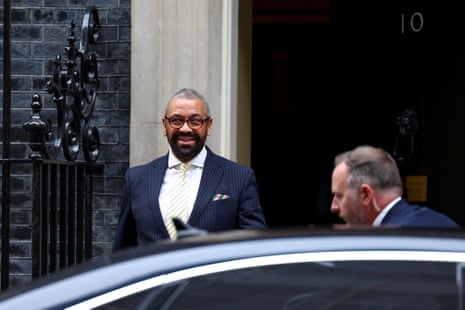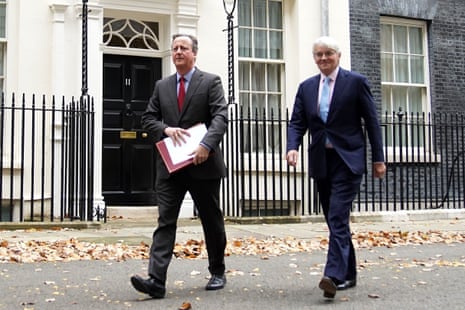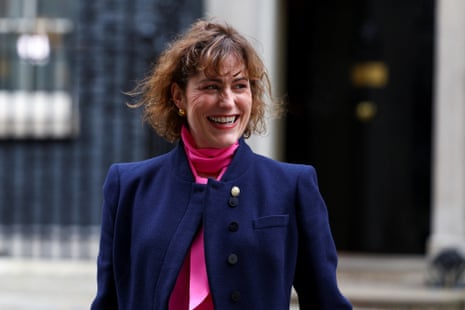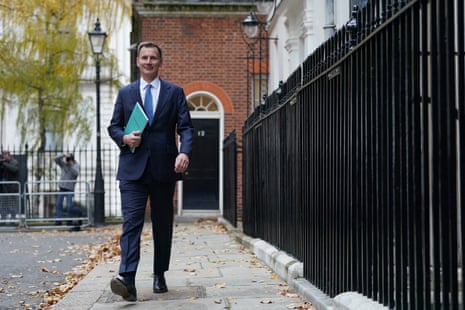Jeremy Hunt to unveil autumn statement as Labour says nothing can change Tories’ ‘appalling’ economic record
Good morning. Today Jeremy Hunt will deliver his second autumn statement since (like his old boss David Cameron) he made a totally unexpected return to cabinet, appointed chancellor as Liz Truss’s premiership was in its death throes. After he delivered his first one just over a year ago, the Guardian’s report led on Britain facing the biggest hit to living standards on record after Hunt announced £30bn of delayed spending cuts and £25bn of backdated tax increases. The Tory papers gave it probably the most negative coverage for any fiscal statement from a Conservative chancellor in modern times. Almost anything today would get a better reception.
But in fact, if the advance briefing is reliable, Hunt is on course to deliver a statement that will get a dramatically better reception. As Larry Elliott and Pippa Crerar report in their preview, he will announce cuts to personal taxes, and a significant raft of pro-business measures.
Here are some of the front pages.
Rishi Sunak and Conservative MPs hope that this will be a turning point in his party’s fortunes. In a speech on Monday, he in effect announced his party’s election strategy, saying it would be a choice between “a Conservative party that is delivering lower taxes because we have now halved inflation and control spending, or a Labour party that’s just going to borrow an enormous amount more, not having learned the lessons at all of not just the last 10 years, but of the last two years, and continue with the same failed prescription, which is more government, more borrowing, more spending”.
But one autumn statement cannot undo the impact of decisions taken over one year, or four years, or 13 years. And, as Torsten Bell, head of the Resolution Foundation thinktank has pointed out, you should never talk about tax cuts without explaining the context.
Short version: you’re not ‘cutting taxes’ if you raise people’s taxes a lot and then given them back a little
This is a point Labour will be making. In a statement released overnight, Rachel Reeves, the shadow chancellor, said:
After 13 years of economic failure under the Conservatives, working people are worse off. Prices are still rising in the shops, energy bills are up and mortgage payments are higher after the Conservatives crashed the economy.
The 25 Tory tax rises since 2019 are the clearest sign of economic failure, with households paying £4,000 more in tax each year than they did in 2010. The Conservatives have become the party of high tax because they are the party of low growth. Nothing the chancellor says or does in his autumn statement can change their appalling record.
Under Keir Starmer’s leadership, the Labour party has changed. Labour is now the party of fiscal responsibility, we are the party of business and we are the only party with a plan to make working people better off.
Today we will be focusing almost exclusively on the autumn statement. Graeme Wearden will be joining me on the blog later and we will be covering the statement in full, and providing reaction and analysis.
Here is the agenda.
8.30am: Rishi Sunak chairs cabinet, where Jeremy Hunt, the chancellor, briefs colleagues on the autumn statement.
12pm: Sunak faces Keir Starmer at PMQs.
12.30pm: Hunt presents his autumn statement to the Commons.
2.30pm: Richard Hughes, chair of the Office for Budget Responsibility, holds a press conference on the OBR’s forecasts.
If you want to contact me, do try the “send us a message” feature. You’ll see it just below the byline – on the left of the screen, if you are reading on a laptop or a desktop. This is for people who want to message me directly. I find it very useful when people message to point out errors (even typos – no mistake is too small to correct). Often I find your questions very interesting, too. I can’t promise to reply to them all, but I will try to reply to as many as I can, either in the comments below the line; privately (if you leave an email address and that seems more appropriate); or in the main blog, if I think it is a topic of wide interest.
Key events
Speculation about the autumn statement mostly focuses on the measures that Jeremy Hunt will announce, but budgets and autumn statements coincide with the Office for Budget Responsibility publishing its latest “economic and fiscal outlook” – a long report with forecasts that serve as a healthcheck on the state of the economy – and by the end of the day it is often the OBR that produces the most startling news lines.
The Financial Times says the OBR might have bad news for Rishi Sunak and Hunt on growth. In a preview it says:
The measures (Hunt) announces are unlikely to forestall some unflattering growth forecasts from the Office for Budget Responsibility, the fiscal watchdog. While GDP growth is likely to be upgraded this year, the picture is less optimistic thereafter. In March the OBR said the UK economy would expand by 1.8 per cent in 2024 and 2.5 per cent in 2025. The Bank of England, by contrast, has predicted near-zero growth for both years.
The OBR’s 1.7 per cent estimate of the UK’s sustainable growth rate, which is how fast the economy can grow without driving excess inflation, is also more optimistic than those of other forecasters. One of Hunt’s goals will be to convince the OBR to give him some economic credit for pro-business policies in its forecasts.
Benn Quinn
Keir Starmer has said that a pause in hostilities between Israel and Hamas must be used to tackle the “urgent and unacceptable humanitarian catastrophe” in Gaza.
Welcoming the deal, which is expected to involve the release of 50 hostages being held by Hamas and a number of women and teenagers from Israeli jails, the Labour leader said his party had been calling for “a substantial humanitarian pause”. He said:
There must be immediate access to aid, food, water, fuel and medicine to ensure hospitals function and lives are saved. Aid and fuel need to not just get in but be distributed widely and safely.
We must also use the space this pause creates to take more steps on a path towards a full cessation of hostilities rather than an escalation of violence.
In his Guardian column today Rafael Behr argues the “headroom” being used by Jeremy Hunt to justify tax cuts (see 10.14am) is predicated on future spending cuts which the Conservatives, were they to win the next election, would never actually implement. He says it’s a trap for Labour. Here is an extract.
The real function of the projected spending squeeze is as a trap for Labour. If the opposition rejects the Tory trajectory, it will be accused of planning a profligate spree with public money. And if it pledges adherence to impossible targets, it will enter government with its hands bound too tight to deliver prompt satisfaction to the people who voted for it.
Keir Starmer and Rachel Reeves have so far operated a sensible policy of not walking into traps of this kind. That approach restored swing voters’ trust in Labour as stewards of the economy. But it tests the patience of an activist base that sees reversal of austerity as a moral imperative and can smell the incipient disappointment in promises of fiscal discipline.
The immediate challenge for Labour after the autumn statement is to avoid getting ensnared in a game of saying whether it would accept or reverse various specific measures. This is a balancing act that involves rejecting the premise of the question without sounding too evasive; refusing to dance to a Tory tune when the whole event is choreographed by the government.
And here is Rafael’s column in full.
And Jeremy Hunt will freeze alcohol duty in the autumn statement, the Sun has been told.
The Financial Times has splashed this morning on a report saying Jeremy Hunt will make the “full expensing” tax relief system for businesses permanent in the autumn statement. It says:
The scheme, which was due to expire in 2026, allows a company to immediately deduct all of its spending on IT equipment, plant or machinery from taxable profits. Extending it was a crucial demand of business groups.
Officials claimed Hunt’s permanent extension would give the UK one of the world’s most generous capital allowance regimes. One said the move would be the “biggest business tax cut in modern British history”.
The independent Office for Budget Responsibility in March said the temporary version of the £9bn-a-year full expensing policy would boost business investment by as much as 3 per cent a year during its initial three-year period.
Here is Phillip Inman’s guide to what to expect in the autumn statement.
Harriet Baldwin, the Conservative MP who chairs the Commons Treasury committee, told GB News that she thinks Jeremy Hunt has “headroom” of around £20bn to use for tax cuts. She said:
If you look at the numbers that the Office for Budget Responsibility has been publishing each month, we think that there’s probably about £20bn of headroom and that’s because you and I, through those frozen tax levels and also businesses, we have actually ended up paying more tax this year than was planned in last year’s budget.
So I think that today gives the chancellor an opportunity to give some of that back to the hard-working businesses and people of this country so that we can grow the economy more rapidly next year.
For an alternative take on headroom, this is from the journalist James Ball.
The “headroom” you’re hearing about – the one to allow for tax cuts – is almost entirely fictional.
It’ll be predicated on real-terms cuts to services in the next parliamentary term that no-one thinks are deliverable, at all.
It’s a stunt.
The “headroom” you’re hearing about – the one to allow for tax cuts – is almost entirely fictional.
It’ll be predicated on real-terms cuts to services in the next parliamentary term that no-one thinks are deliverable, at all.
It’s a stunt. https://t.co/a09CZAjYE5
— James Ball (@jamesrbuk) November 21, 2023
Whitty tells Covid inquiry it would have been ‘inconceivable’ to have had herd immunity as policy goal
Prof Sir Chris Whitty, the chief medical officer for England and chief medical adviser for the UK, is still giving evidence to the Covid inquiry this morning. I’m mostly focused on the autumn statement, but my colleague Peter Walker is following the Whitty evidence, and he has posted these on X.
We’re back with Chris Whitty at the Covid inquiry, and still in mid-March 2020. Even then with 500+ UK cases, Whitty says, many in No 10 still did not realise how fast things would move: “This was a lot of people really not getting what exponential growth was going to mean.”
We’re back with Chris Whitty at the Covid inquiry, and still in mid-March 2020. Even then with 500+ UK cases, Whitty says, many in No 10 still did not realise how fast things would move: “This was a lot of people really not getting what exponential growth was going to mean.”
— Peter Walker (@peterwalker99) November 22, 2023
We’re now onto the idea of herd immunity, which Whitty says was misunderstood by many. It would be “inconceivable” to have it as a policy goal, and would have brought “extraordinarily high loss of life”, while v possibly not even doing what it was meant to.
Whitty on herd immunity: “My view is it was clearly a ridiculous goal of policy, and a dangerous one, and lots of what was said (about it) could have led to considerable confusion, and did.”
Chris Whitty says he sent WhatsApps to a group including Boris Johnson, Matt Hancock and officials urging people to not discuss herd immunity: “Frankly there was a lot of chatter by people who at best half understood the issues.”
Cabinet ministers were told what would be in the autumn statement when they met at Downing Street this morning. They don’t talk to journalists as they leave, but judging by the pictures, they seemed rather pleased by what they had heard. Government ministers don’t normally look this cheerful.

Photograph: Hannah McKay/Reuters





Jeremy Hunt to unveil autumn statement as Labour says nothing can change Tories’ ‘appalling’ economic record
Good morning. Today Jeremy Hunt will deliver his second autumn statement since (like his old boss David Cameron) he made a totally unexpected return to cabinet, appointed chancellor as Liz Truss’s premiership was in its death throes. After he delivered his first one just over a year ago, the Guardian’s report led on Britain facing the biggest hit to living standards on record after Hunt announced £30bn of delayed spending cuts and £25bn of backdated tax increases. The Tory papers gave it probably the most negative coverage for any fiscal statement from a Conservative chancellor in modern times. Almost anything today would get a better reception.
But in fact, if the advance briefing is reliable, Hunt is on course to deliver a statement that will get a dramatically better reception. As Larry Elliott and Pippa Crerar report in their preview, he will announce cuts to personal taxes, and a significant raft of pro-business measures.
Here are some of the front pages.
Rishi Sunak and Conservative MPs hope that this will be a turning point in his party’s fortunes. In a speech on Monday, he in effect announced his party’s election strategy, saying it would be a choice between “a Conservative party that is delivering lower taxes because we have now halved inflation and control spending, or a Labour party that’s just going to borrow an enormous amount more, not having learned the lessons at all of not just the last 10 years, but of the last two years, and continue with the same failed prescription, which is more government, more borrowing, more spending”.
But one autumn statement cannot undo the impact of decisions taken over one year, or four years, or 13 years. And, as Torsten Bell, head of the Resolution Foundation thinktank has pointed out, you should never talk about tax cuts without explaining the context.
Short version: you’re not ‘cutting taxes’ if you raise people’s taxes a lot and then given them back a little
This is a point Labour will be making. In a statement released overnight, Rachel Reeves, the shadow chancellor, said:
After 13 years of economic failure under the Conservatives, working people are worse off. Prices are still rising in the shops, energy bills are up and mortgage payments are higher after the Conservatives crashed the economy.
The 25 Tory tax rises since 2019 are the clearest sign of economic failure, with households paying £4,000 more in tax each year than they did in 2010. The Conservatives have become the party of high tax because they are the party of low growth. Nothing the chancellor says or does in his autumn statement can change their appalling record.
Under Keir Starmer’s leadership, the Labour party has changed. Labour is now the party of fiscal responsibility, we are the party of business and we are the only party with a plan to make working people better off.
Today we will be focusing almost exclusively on the autumn statement. Graeme Wearden will be joining me on the blog later and we will be covering the statement in full, and providing reaction and analysis.
Here is the agenda.
8.30am: Rishi Sunak chairs cabinet, where Jeremy Hunt, the chancellor, briefs colleagues on the autumn statement.
12pm: Sunak faces Keir Starmer at PMQs.
12.30pm: Hunt presents his autumn statement to the Commons.
2.30pm: Richard Hughes, chair of the Office for Budget Responsibility, holds a press conference on the OBR’s forecasts.
If you want to contact me, do try the “send us a message” feature. You’ll see it just below the byline – on the left of the screen, if you are reading on a laptop or a desktop. This is for people who want to message me directly. I find it very useful when people message to point out errors (even typos – no mistake is too small to correct). Often I find your questions very interesting, too. I can’t promise to reply to them all, but I will try to reply to as many as I can, either in the comments below the line; privately (if you leave an email address and that seems more appropriate); or in the main blog, if I think it is a topic of wide interest.



